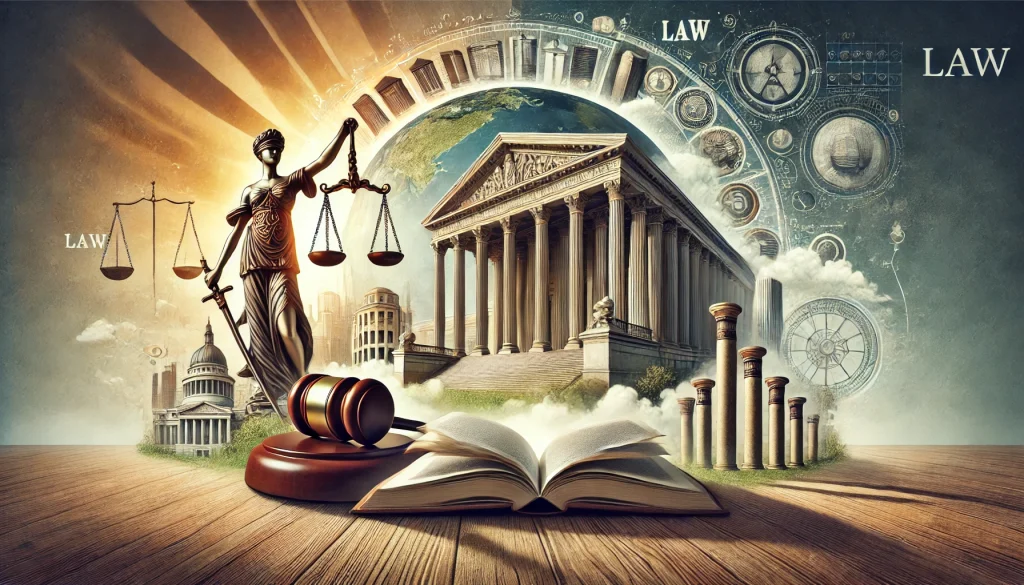Law is the bedrock of a functioning society, regulating behavior, ensuring justice, and providing a framework for resolving disputes. It governs almost every aspect of human interaction, from commerce to personal conduct, and acts as a guide for behavior by outlining rights, duties, and consequences. Understanding the fundamentals of law is essential for comprehending how societies maintain order and justice. This overview will explore the core principles, types, sources, and key aspects of law that form the foundation of legal systems worldwide.
1. Definition and Purpose of Law
Law can be defined as a system of rules and guidelines, enforced by governmental institutions, that regulate the actions of individuals and organizations within a society. The primary purpose of law is to maintain social order, protect individuals’ rights, uphold justice, and resolve conflicts. It serves as a tool for shaping behavior and ensuring that all members of society are held accountable under the same standards.
2. Sources of Law
Laws derive from various sources, and these vary by country and legal tradition. The main sources of law include:
- Constitutions: The supreme legal documents outlining the structure of government and fundamental rights of citizens.
- Legislation: Statutes and regulations passed by legislative bodies such as parliaments or congresses.
- Case Law: Judicial decisions that establish legal precedents, particularly in common law systems.
- Customary Law: Long-standing traditions and customs recognized as binding, often in indigenous or religious contexts.
- International Law: Agreements and treaties between nations that govern international relations and global issues.
3. Branches of Law
Law is divided into several branches, each addressing different aspects of social interaction:
- Criminal Law: Governs crimes and punishments, ensuring public safety by deterring and punishing unlawful acts.
- Civil Law: Deals with disputes between individuals or organizations, often involving contracts, property, or family matters.
- Constitutional Law: Focuses on the rules and principles governing the functioning of a state, including citizens’ fundamental rights.
- Administrative Law: Regulates the activities of government agencies, ensuring legal accountability in their decision-making.
- International Law: Concerns relations between countries, including issues such as trade, diplomacy, and human rights.
4. Legal Systems Around the World
Different countries have distinct legal systems based on historical, cultural, and social factors. The three primary legal systems are:
- Common Law: Based on judicial decisions and precedent, common in the UK, US, and former British colonies.
- Civil Law: Codified laws and statutes dominate, prevalent in countries like France, Germany, and Japan.
- Religious Law: Systems such as Islamic Sharia law, where legal rules are derived from religious texts and principles.
5. The Rule of Law
The “rule of law” is a foundational concept in legal theory. It means that laws are applied uniformly and consistently, without bias or arbitrary power. Everyone, regardless of status, is subject to the law, ensuring fairness, transparency, and accountability in governance. The rule of law also acts as a safeguard against tyranny and protects individual freedoms by limiting government power.
6. The Role of the Judiciary in Law
The judiciary interprets and applies the law. Judges and courts ensure that laws are followed, rights are protected, and disputes are resolved fairly. In common law systems, courts also create legal precedents that influence future cases. The independence of the judiciary from other branches of government is crucial for maintaining impartiality and upholding justice.
7. The Importance of Legal Rights and Responsibilities
One of the fundamental purposes of law is to delineate individual rights and responsibilities. Rights protect citizens’ freedoms, such as the right to free speech, privacy, and fair treatment. Responsibilities ensure that individuals and entities act within the bounds of the law, respecting others’ rights and maintaining social harmony.
8. Legal Procedures and Due Process
Due process refers to the legal procedures that must be followed to ensure fairness in the justice system. This includes the right to a fair trial, the presumption of innocence, and the opportunity to present evidence and contest charges. Legal procedures are designed to protect individuals from arbitrary or unjust treatment by the state or other entities.
9. The Role of Lawyers and Legal Professionals
Lawyers, prosecutors, defense attorneys, and legal advisors play a vital role in the functioning of the legal system. They represent individuals or organizations in legal matters, provide advice, and help clients navigate complex legal processes. Ethical conduct and knowledge of legal principles are essential for maintaining trust and integrity within the legal profession.
10. The Future of Law: Technology and Globalization
The field of law is evolving rapidly due to technological advances and globalization. Innovations like artificial intelligence (AI) and blockchain technology are changing how legal services are delivered, while global issues such as climate change, cybercrime, and international trade require new legal frameworks. Globalization has also led to increased interaction between different legal systems, raising questions about the harmonization of laws and international justice.
Conclusion
The Fundamentals of Law encompass a broad range of principles and systems that guide behavior, resolve disputes, and protect rights in society. From its basic definition and purpose to its evolving role in the modern world, law is indispensable to maintaining order and justice. By understanding the key concepts such as the rule of law, legal systems, rights and responsibilities, and the importance of legal procedures, we gain insight into how societies function and how justice is served. As the law continues to adapt to societal changes, its foundational principles remain crucial for ensuring fairness, equality, and the protection of individual freedoms.

